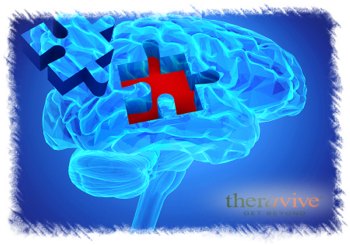 Schizophrenia is a chronic and severe neurological brain
disorder which can gravely affect a person’s functioning at many
different levels. According to the National Institute of Mental Health (NIMH), about
2.6 million Americans are affected by the illness whose debilitating challenges
are often extended to their families.
Schizophrenia is a chronic and severe neurological brain
disorder which can gravely affect a person’s functioning at many
different levels. According to the National Institute of Mental Health (NIMH), about
2.6 million Americans are affected by the illness whose debilitating challenges
are often extended to their families.
What makes the disease so complex is its underlying etiology confounded by both genetic and environmental factors. Although the
illness is understood to be highly hereditary, many aspects of its pathophysiology
remains largely unknown or poorly understood despite extensive research being
conducted ongoing.
It
has long been established that the pathogenesis of schizophrenia is linked to the
dysfunction of the dopaminergic neurotransmitter system which leads to a
reduced dopamine concentration in cortical regions responsible for executive
functioning.
Pruning
The dopamine hypothesis, however, does not provide the neurobiological basis
for the illness in terms of how specific genes or gene variations might lead to
certain brain abnormalities seen in schizophrenia.
A new
groundbreaking study conducted by researchers at the Broad
Institute of MIT and Harvard may very well have some answers to this dilemma, shedding
further light on how pruning of synapses in the brain can affect the
development of schizophrenia at a molecular level (Healy, 2016).
Scientists
are claiming that pruning is a necessary and requisite process for the infant/child/adolescent
brain to properly transition into adulthood. If overactive, however, the
process can remove synapses at random, indiscriminately eliminating
critical neural connections.
Based on extensive genetic tests on nearly 65,000 people, the research team
has finally identified genes responsible for this overactive pruning process
resulting in genetic variations linked to schizophrenia (ibid.).
C4 Genes
Based on the data collected, it was concluded that people with certain variants
of C4 genes located in the region called Major Histocompatibility Complex (MHC) had a significantly
higher risk of developing schizophrenia, independent of other genetic
predispositions.
Notably, C4 genes have been found to be particularly active around late
adolescence, editing necessary neural connections initiated during infancy and
childhood.
The deficiency in C4 genes, however, can overactivate this pruning process, drastically
removing certain synapses critical to normal, healthy brain development.
MHC is a genetic region which has been formerly known to play a key role in
the immune system but is now found to be closely linked to schizophrenia.
It was also found that MHC contains
DNA variants associated with genome variations which could increase the risk of
developing the disease.
Implication
These
findings have opened a new doorway into what has long been regarded as a
“black box” by many researchers, scientists, and medical professionals.
By
no means is this the panacea for much of what still remains as a big mystery; however, the
study has certainly transformed the way schizophrenia is viewed and understood.
At minimum, the new findings could revolutionize the way the disease is treated.
According to NIMH, an estimated 40 percent of individuals with
the condition are untreated in any given year. With
the new information learned, it might now be possible to develop a more novel and
innovative approach to treating schizophrenia beyond the mere symptom reduction with much less severe side effects.
More
importantly, the study could eventually help de-mystify the disease as a
treatable and even a preventable condition and no longer as a permanently incapacitating
illness.
And
this possibility alone is a major breakthrough offering new hope for those currently
living with the disease and their families.
References
Healy,
M. January 27, 2016. Geneticists uncover a key clue to schizophrenia. Los
Angeles Times. Retrieved from http://www.latimes.com/science/sciencenow/la-sci-sn-genetic-clue-schizophrenia-20160127-story.html
About the Author

Dr. Agnes Oh
, PsyD, LMFTDr. Agnes Oh is dually licensed as a clinical psychologist and a marriage and family therapist.
For the last fifteen years, Dr. Oh has devoted her practice primarily in the areas of trauma, grief/loss, couples/family issues, and multicultural counseling, as well as personal empowerment. Dr. Oh is an avid proponent of a strength-based, relational approach to helping people as she firmly believes in each person’s intrinsic power to heal, grow, and thrive given the proper guidance and support.
Office Location:
1010 N. Central Ave. Ste. 303
Glendale, California
91202
United States
Phone: (818) 441-1096
Contact Dr. Agnes Oh
Professional Website:
www.dragnesoh.com